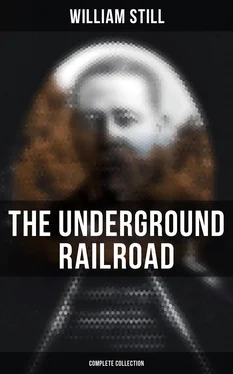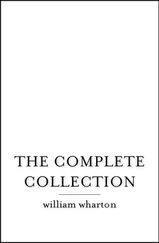But, alas, for the slave-holder! Jane had her "top eye open," and in that brief space had appealed to the sympathies of a person whom she ventured to trust, saying, "I and my children are slaves, and we want liberty!" I am not certain, but suppose that person, in the goodness of his heart, was the cause of the note being sent to the Anti-Slavery office, and hence the result.
As to her going on to New York to see her friends, and wishing to return to her three children in the South, and his going to free her, &c., Jane declared repeatedly and very positively, that there was not a particle of truth in what her master said on these points. The truth is she had not the slightest hope of freedom through any act of his. She had only left one boy in the South, who had been sold far away, where she scarcely ever heard from him, indeed never expected to see him any more.
In appearance Jane is tall and well formed, high and large forehead, of genteel manners, chestnut color, and seems to possess, naturally, uncommon good sense, though of course she has never been allowed to read.
Thus I have given as truthful a report as I am capable of doing, of Jane and the circumstances connected with her deliverance.
W. STILL.
P.S. — Of the five colored porters who promptly appeared, with warm hearts throbbing in sympathy with the mother and her children, too much cannot be said in commendation. In the present case they acted nobly, whatever may be said of their general character, of which I know nothing. How human beings, who have ever tasted oppression, could have acted differently under the circumstances I cannot conceive.
The mystery alluded to, which the above letter did not contain, and which the court failed to make Mr. Williamson reveal, might have been truthfully explained in these words. The carriage was procured at the wharf, while Col. Wheeler and Mr. Williamson were debating the question relative to the action of the Committee, and at that instant, Jane and her two boys were invited into it and accompanied by the writer, who procured it, were driven down town, and on Tenth Street, below Lombard, the inmates were invited out of it, and the said conductor paid the driver and discharged him. For prudential reasons he took them to a temporary resting-place, where they could tarry until after dark; then they were invited to his own residence, where they were made welcome, and in due time forwarded East. Now, what disposition was made of them after they had left the wharf, while Williamson and Wheeler were discussing matters — (as was clearly sworn to by Passmore, in his answer to the writ of Habeas Corpus) — he Williamson did not know. That evening, before seeing the member of the Committee, with whom he acted in concert on the boat, and who had entire charge of Jane and her boys, he left for Harrisburg, to fulfill business engagements. The next morning his father (Thomas Williamson) brought the writ of Habeas Corpus (which had been served at Passmore's office after he left) to the Anti-Slavery Office. In his calm manner he handed it to the writer, at the same time remarking that "Passmore had gone to Harrisburg," and added, "thee had better attend to it" (the writ). Edward Hopper, Esq., was applied to with the writ, and in the absence of Mr. Williamson, appeared before the court, and stated "that the writ had not been served, as Mr. W. was out of town," etc.
After this statement, the Judge postponed further action until the next day. In the meanwhile, Mr. Williamson returned and found the writ awaiting him, and an agitated state of feeling throughout the city besides. Now it is very certain, that he did not seek to know from those in the secret, where Jane Johnson and her boys were taken after they left the wharf, or as to what disposition had been made of them, in any way; except to ask simply, "are they safe?" (and when told "yes," he smiled) consequently, he might have been examined for a week, by the most skillful lawyer, at the Philadelphia bar, but he could not have answered other than he did in making his return to the writ, before Judge Kane, namely: " That the persons named in the writ, nor either of them, are now nor was at the time of issuing of the writ, or the original writ, or at any other time in the custody, power, or possession of the respondent, nor by him confined or restrained; wherefore he cannot have the bodies," etc. .
Thus, while Mr. W. was subjected to the severest trial of his devotion to Freedom, his noble bearing throughout, won for him the admiration and sympathy of the friends of humanity and liberty throughout the entire land, and in proof of his fidelity, he most cheerfully submitted to imprisonment rather than desert his principles. But the truth was not wanted in this instance by the enemies of Freedom; obedience to Slavery was demanded to satisfy the South. The opportunity seemed favorable for teaching abolitionists and negroes, that they had no right to interfere with a "chivalrous southern gentleman," while passing through Philadelphia with his slaves. Thus, to make an effective blow, all the pro-slavery elements of Philadelphia were brought into action, and matters looked for a time as though Slavery in this instance would have everything its own way. Passmore was locked up in prison on the flimsy pretext of contempt of court, and true bills were found against him and half a dozen colored men, charging them with "riot," "forcible abduction," and "assault and battery," and there was no lack of hard swearing on the part of Col. Wheeler and his pro-slavery sympathizers in substantiation of these grave charges. But the pro-slaveryites had counted without their host — Passmore would not yield an inch, but stood as firmly by his principles in prison, as he did on the boat. Indeed, it was soon evident, that his resolute course was bringing floods of sympathy from the ablest and best minds throughout the North. On the other hand, the occasion was rapidly awakening thousands daily, who had hitherto manifested little or no interest at all on the subject, to the wrongs of the slave.
It was soon discovered by the "chivalry" that keeping Mr. Williamson in prison would indirectly greatly aid the cause of Freedom — that every day he remained would make numerous converts to the cause of liberty; that Mr. Williamson was doing ten-fold more in prison for the cause of universal liberty than he could possibly do while pursuing his ordinary vocation.
With regard to the colored men under bonds, Col. Wheeler and his satellites felt very confident that there was no room for them to escape. They must have had reason so to think, judging from the hard swearing they did, before the committing magistrate. Consequently, in the order of events, while Passmore was still in prison, receiving visits from hosts of friends, and letters of sympathy from all parts of the North, William Still, William Curtis, James P. Braddock, John Ballard, James Martin and Isaiah Moore, were brought into court for trial. The first name on the list in the proceedings of the court was called up first.
Against this individual, it was pretty well understood by the friends of the slave, that no lack of pains and false swearing would be resorted to on the part of Wheeler and his witnesses, to gain a verdict.
Mr. McKim and other noted abolitionists managing the defense, were equally alive to the importance of overwhelming the enemy in this particular issue. The Hon. Charles Gibbons, was engaged to defend William Still, and William S. Pierce, Esq., and William B. Birney, Esq., the other five colored defendants.
In order to make the victory complete, the anti-slavery friends deemed it of the highest importance to have Jane Johnson in court, to face her master, and under oath to sweep away his "refuge of lies," with regard to her being "abducted," and her unwillingness to "leave her master," etc. So Mr. McKim and the friends very privately arranged to have Jane Johnson on hand at the opening of the defense.
Читать дальше












